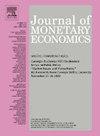Do firm expectations respond to monetary policy announcements?
IF 4.3
2区 经济学
Q1 BUSINESS, FINANCE
引用次数: 0
Abstract
This paper investigates whether UK firms’ price growth expectations respond to the Bank of England (BoE) monetary policy announcements and explores the underlying mechanism. Using microdata from the UK Decision Maker Panel survey, we isolate the exogenous component of the monetary policy decisions by comparing firms’ responses filed before and after BoE announcements. Guided by a model of dispersed information, our analysis suggests that firms respond to monetary policy announcements but are, overall, not as informed and sophisticated as financial market participants. Firms’ price expectations respond to actual interest rate changes, as well as to bank rate changes purged from their systematic component, but not to high-frequency surprises. The left tail of their expected price change distribution is particularly sensitive to monetary policy announcements. Furthermore, we unveil significant non-linear effects, with changes in interest rates of 50 basis points being mostly responsible for revisions in expectations. This implies that the recent tightening cycle was effective in shifting firms’ expectations primarily at its peak when a sequence of consecutive large rate hikes was implemented. We also show that UK news coverage of the BoE’s activities increases following policy rate changes, highlighting the media’s crucial role in shaping public expectations.
企业预期是否会对货币政策公告做出反应?
本文研究了英国公司的价格增长预期是否会对英格兰银行(BOE)的货币政策公告做出反应,并探讨了其背后的机制。我们利用英国决策者面板调查的微观数据,通过比较英国央行公告前后企业的反应,分离出货币政策决策的外生因素。在信息分散模型的指导下,我们的分析表明,企业会对货币政策公告做出反应,但总体而言,企业不如金融市场参与者知情和成熟。企业的价格预期会对实际利率变化以及剔除了系统性因素的银行利率变化做出反应,但不会对高频率的意外事件做出反应。其预期价格变化分布的左尾部对货币政策公告尤为敏感。此外,我们还发现了显著的非线性效应,50 个基点的利率变化是造成预期修正的主要原因。这意味着近期的紧缩周期主要是在连续大幅加息的高峰期有效地改变了企业的预期。我们还表明,英国对英国央行活动的新闻报道在政策利率变化后会增加,这凸显了媒体在塑造公众预期方面的关键作用。
本文章由计算机程序翻译,如有差异,请以英文原文为准。
求助全文
约1分钟内获得全文
求助全文
来源期刊

Journal of Monetary Economics
Multiple-
CiteScore
7.20
自引率
4.90%
发文量
90
审稿时长
74 days
期刊介绍:
The profession has witnessed over the past twenty years a remarkable expansion of research activities bearing on problems in the broader field of monetary economics. The strong interest in monetary analysis has been increasingly matched in recent years by the growing attention to the working and structure of financial institutions. The role of various institutional arrangements, the consequences of specific changes in banking structure and the welfare aspects of structural policies have attracted an increasing interest in the profession. There has also been a growing attention to the operation of credit markets and to various aspects in the behavior of rates of return on assets. The Journal of Monetary Economics provides a specialized forum for the publication of this research.
 求助内容:
求助内容: 应助结果提醒方式:
应助结果提醒方式:


